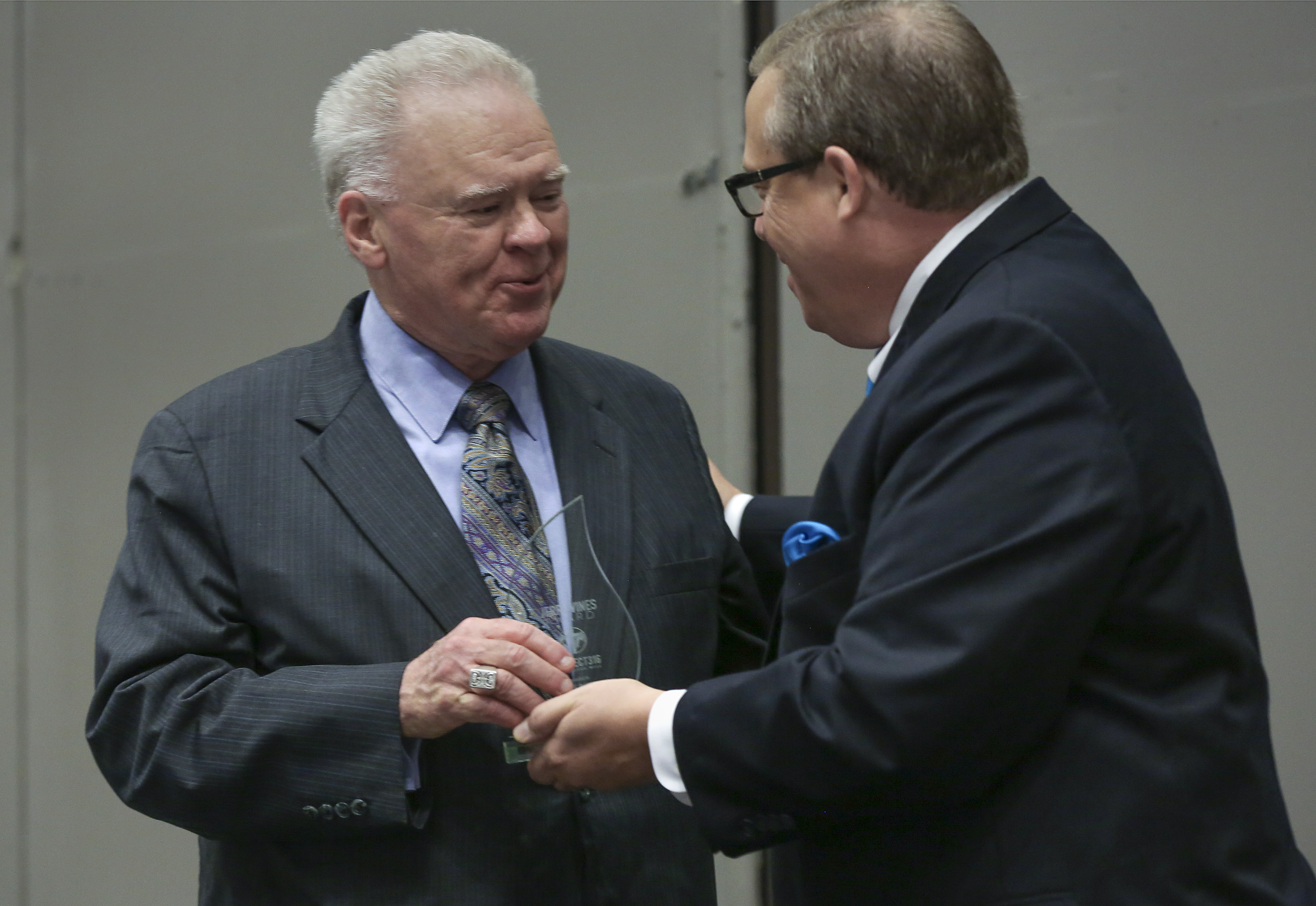
ST. LOUIS (BP) — Cooperation among Southern Baptists with diverse theological views, the definition of “Gospel” and the extent of the atonement were among the topics addressed at the Connect316 banquet June 14 in conjunction with the Southern Baptist Convention’s annual meeting in St. Louis.
 Connect316 — a coalition of Southern Baptists who advocate what they call a “traditionalist” understanding of the doctrine of salvation and disagree with some points of so-called “New Calvinism” — also presented Southwestern Baptist Theological Seminary President Paige Patterson with the Jerry Vines Award for the Promotion of Whosoever Will Doctrine in Southern Baptist Life.
Connect316 — a coalition of Southern Baptists who advocate what they call a “traditionalist” understanding of the doctrine of salvation and disagree with some points of so-called “New Calvinism” — also presented Southwestern Baptist Theological Seminary President Paige Patterson with the Jerry Vines Award for the Promotion of Whosoever Will Doctrine in Southern Baptist Life.
Braxton Hunter, the first of three speakers and president of Trinity College of the Bible and Theological Seminary in Newburgh, Ind., encouraged traditionalists and Calvinists to work together in the SBC.
“The Gospel is too important” to “fracture the convention” between Calvinists and traditionalists, Hunter said. “We need to cooperate where we can.”
Still, Hunter noted a concern that “certain entities,” like the broadly Reformed groups The Gospel Coalition and Together for the Gospel, “have positioned themselves in such a way in name and posture so as to indicate that they are more adequately representing the Gospel than other groups are of differing soteriological persuasions.” Traditionalists should respond to such groups by articulating their views on salvation with clarity and courage, he said.
The relationship in Scripture between God’s sovereignty and human freedom is not utterly incomprehensible, Hunter said. Rather than resign themselves to accepting these two notions as mysterious and irreconcilable in this life, believers should use theology and philosophy to argue against any form of determinism and defend the view that “anyone can be saved, Jesus died for everyone and God wants everyone to be saved.” Hunter also argued that being born again does not precede the exercise of faith.
Blake Newsom, pastor of Dauphin Way Baptist Church in Mobile, Ala., said the term “Gospel” is losing its meaning in some circles because it is used as a “buzzword” rather than a technical term to reference Scripture’s message about Jesus.
“It has lost or is losing its core identity and meaning due to the books, conversations and retweets of … empty statements about the Gospel,” Newsom said.
The term Gospel is not synonymous with formal evangelistic presentations, “important Christian doctrines” or “implications of the Gospel,” Newsom said. Citing 1 Corinthians 15:3-5, he said the Gospel is a description of “the person and work of Christ as depicted in Scripture and [its] application to humanity.”
Some contemporary Gospel presentations “tend to be too propositional,” Newsom said. “They need to be more personal. That means we are simply telling people about the person and work of Jesus. We are not ticking through theological points.”
David Allen, dean of Southwestern Seminary’s school of theology, said the doctrine of unlimited atonement is “very close to the heart of the Gospel, so we can’t afford to get it wrong.”
Unlimited atonement refers to the idea that on the cross, Christ paid the penalty due for every human’s sin. Limited atonement is the view Christ’s death paid only for the sins of the elect.
Allen, author of the 2016 book “The Extent of the Atonement: History and Critique” (B&H), said believing Christ died only for the elect — however that term is defined — leads logically to the conclusion that some people are “not savable” and makes a universal offer of the Gospel “disingenuous.”
“When you offer salvation to everybody, if you’re a preacher who believes in limited atonement, you’re offering something to a group of people in your audience that does not exist” because there is no means of salvation apart from Christ’s atonement, Allen said. “How do you justify that?”
The doctrine of limited atonement arose primarily during the past 400 years, said Allen, who will become dean of the seminary’s school of preaching Aug. 1. He said proponents of unlimited atonement include “Augustine and every early church father through the sixth century”; “all of the medieval theologians with the exception of a French monk named Gottschalk in the ninth century”; John Calvin; Martin Luther; Andrew Fuller; and the first three SBC presidents.
In presenting the Vines Award to Patterson, Connect316 executive director Rick Patrick noted the Southwestern Seminary president’s “cordial debate” of Calvinism in 2006 with Southern Baptist Theological Seminary President R. Albert Mohler Jr. and his authorship of a chapter in the 2010 Book “Whosoever Will” (B&H).
For proponents of a traditionalist doctrine of salvation, “I cannot even imagine where we would be today without the preaching and the writing and the stellar leadership of Dr. Paige Patterson,” said Patrick, pastor of First Baptist Church in Sylacauga, Ala.
















